A sacred anointing in biblical times, unction signifies divine selection and empowerment, beckoning a deeper exploration of its spiritual significance.

Unction in the Bible
As you step into the realm of biblical history, the concept of unction unfolds like a scroll, revealing layers of sacred practices and profound implications.
You'll find that unction, beyond its initial anointing with oil, represents a deep spiritual endowment, touching kings, prophets, and believers with a divine purpose.
In the Old Testament, it served as a tangible sign of God's choice and presence, evolving into a more nuanced role within the New Testament through the workings of the Holy Spirit.
This exploration promises to illuminate not only the historical roots but also the modern significance of unction, leaving you at the threshold of a deeper understanding, compelled to peer further into its rich tapestry.
Key Takeaways
- Unction symbolizes spiritual anointment and healing, bridging the divine with the mundane in sacred rituals.
- The Holy Spirit plays a pivotal role, empowering believers with guidance, presence, and spiritual gifts.
- Spiritual imagery such as a dove or flame represents the Holy Spirit's influence and guidance in believers' lives.
- Biblical unction transcends ritual, empowering individuals spiritually for deeper divine connection and moral leadership.
Historical Roots of Unction
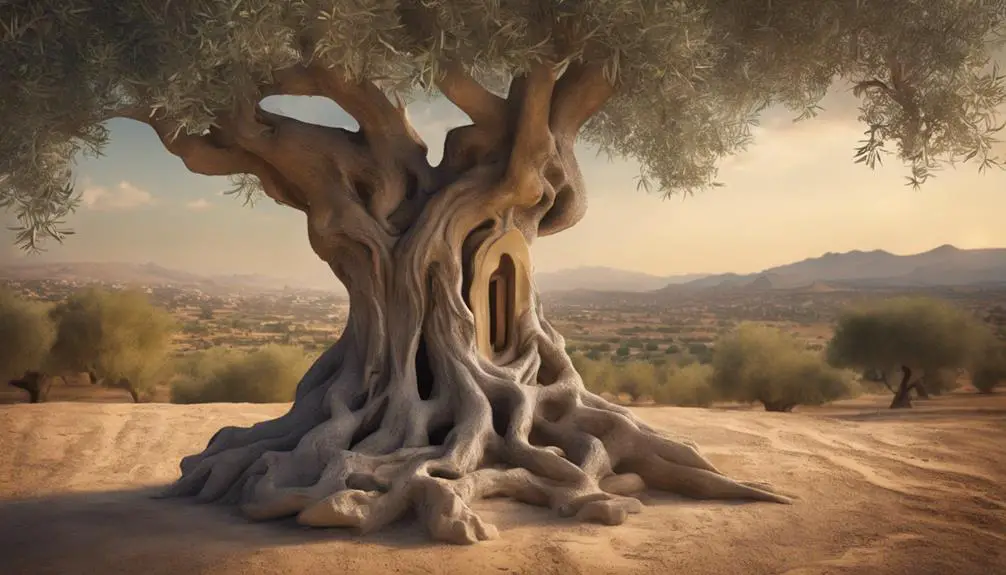
Unction, deeply rooted in ancient traditions, finds its earliest recorded practices in the sacred texts of the Bible, serving as a profound symbol of spiritual anointment and healing. This rite, transcending mere ritualistic application, embodies a rich tapestry of ceremonial uses and cultural significance that has permeated various societies throughout history. You'll find that the essence of unction in these ancient contexts isn't merely about the physical act but rather its capability to bridge the divine with the mundane.
The ceremonial uses of unction were manifold, each imbued with deep spiritual connotations. Kings, prophets, and priests were anointed as a sign of divine selection and empowerment for their respective roles. This act wasn't taken lightly; it was a solemn declaration of God's favor and presence. Thus, the oil in these ceremonies wasn't just a substance but a symbol of God's Spirit being poured out upon the anointed, setting them apart for holy service.
Moreover, the cultural significance of unction can't be overstated. It served as a tangible expression of God's sanctifying grace, a concept that resonated deeply within the community of believers. In times of sickness, unction was sought for healing, reflecting a profound understanding of God's mercy and power over physical and spiritual maladies. It was a practice that underscored the community's reliance on divine providence, fostering a sense of unity and shared faith.
In essence, the historical roots of unction reveal a practice rich in meaning, serving not only as a conduit of God's grace but also as a cornerstone of cultural identity among the faithful. Its legacy is a testament to the enduring power of sacred rituals to communicate divine truth and foster communal bonds.
Unction in Old Testament Practices
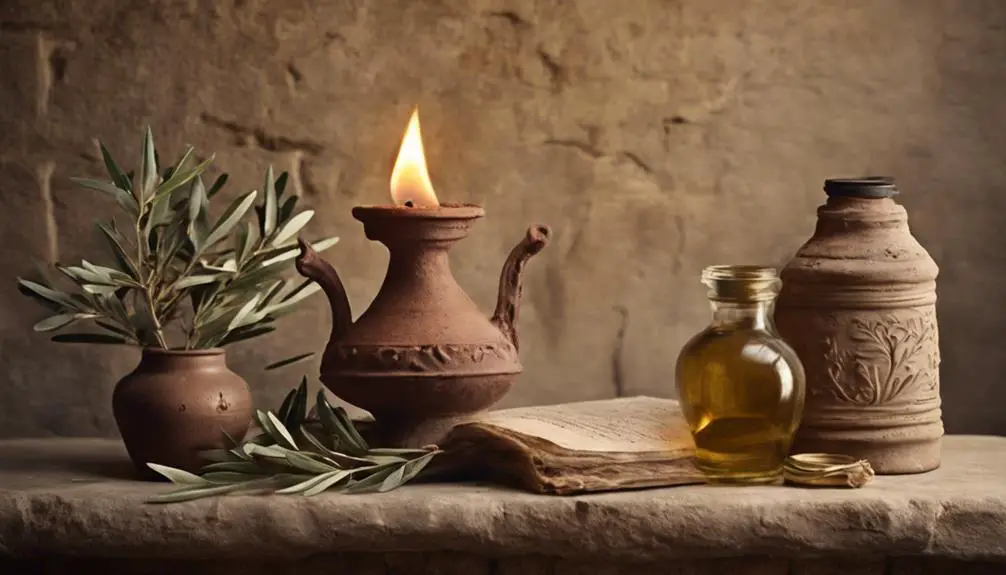
CURRENT SUBTOPIC: 'Unction in Old Testament Practices'
Delving into Old Testament practices, we observe that several key figures underwent anointing, signifying their divine election for leadership and sacred duties. This rite of anointing, deeply intertwined with priestly rituals and sacrificial ceremonies, underscored the sanctity and divine approval of the roles individuals played within the religious and societal hierarchy of ancient Israel.
Aspect |
Significance |
|---|---|
Priestly Rituals |
Anointing was a pivotal act in consecrating priests, symbolizing their purification and dedication to serving God and the community. It set them apart for their sacred role, enabling them to perform sacrifices and mediate between the divine and the people. |
Sacrificial Ceremonies |
Oil, often used in anointing, played a crucial role in various sacrificial ceremonies. Beyond its physical application, the act represented a deeper spiritual consecration, enhancing the sanctity of offerings made to God. |
You'll find that anointing in these contexts wasn't merely a ritualistic act but a profound declaration of divine selection and blessing. It imbued ordinary elements with extraordinary significance, transforming them into symbols of God's presence and favor.
Through these practices, the Old Testament teaches us about the depth of God's interaction with His chosen people. The act of anointing within priestly rituals and sacrificial ceremonies wasn't just about the physical application of oil but symbolized a deeper, spiritual consecration and dedication. It highlighted the importance of divine guidance in leadership and the sacredness of serving God's purposes.
The Anointing of Kings and Prophets
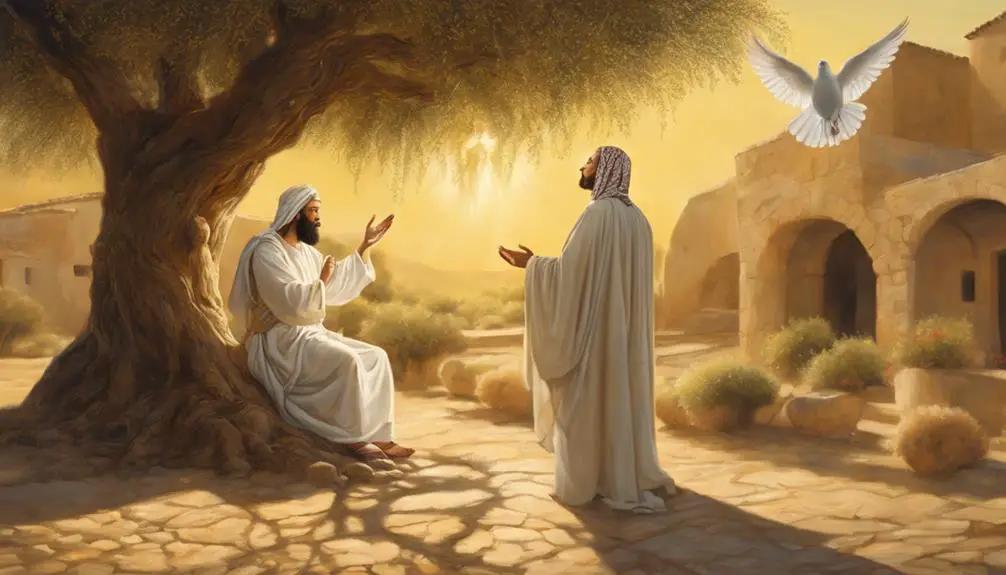
Moving beyond the sacred rites of priests and sacrificial ceremonies, we now explore how anointing distinguished kings and prophets, marking them as chosen instruments of divine will in the unfolding biblical narrative. This ceremonial act didn't merely confer a title; it represented a profound divine selection, setting individuals apart for leadership and guidance according to God's purpose. Through the anointing, the spiritual essence of their mission was symbolically imbued upon them, intertwining their earthly authority with heavenly mandate.
Consider these vivid scenes that encapsulate the gravity and sanctity of such moments:
- The Anointing of Saul: As the first king of Israel, Saul's anointing by the prophet Samuel was a pivotal moment of divine selection, setting a precedent for the monarchy in Israel.
- David's Anointing: Perhaps the most iconic, David's anointing by Samuel signified not just the passing of royal authority but the beginning of a covenantal lineage, highlighting the intimate relationship between divine choice and kingship.
- Solomon's Anointing: Solomon's anointing established a period of unparalleled wisdom and prosperity, underlining the idea that divine selection was aimed at fulfilling God's promises to His people.
- Elisha's Anointing by Elijah: This moment symbolized the passing of prophetic authority, ensuring that the voice of God would continue to guide Israel through Elisha.
These ceremonial rituals were far more than symbolic acts; they were tangible expressions of divine selection, weaving the human with the divine, and underscoring the sacred responsibilities bestowed upon these chosen leaders and prophets.
New Testament Perspectives on Unction
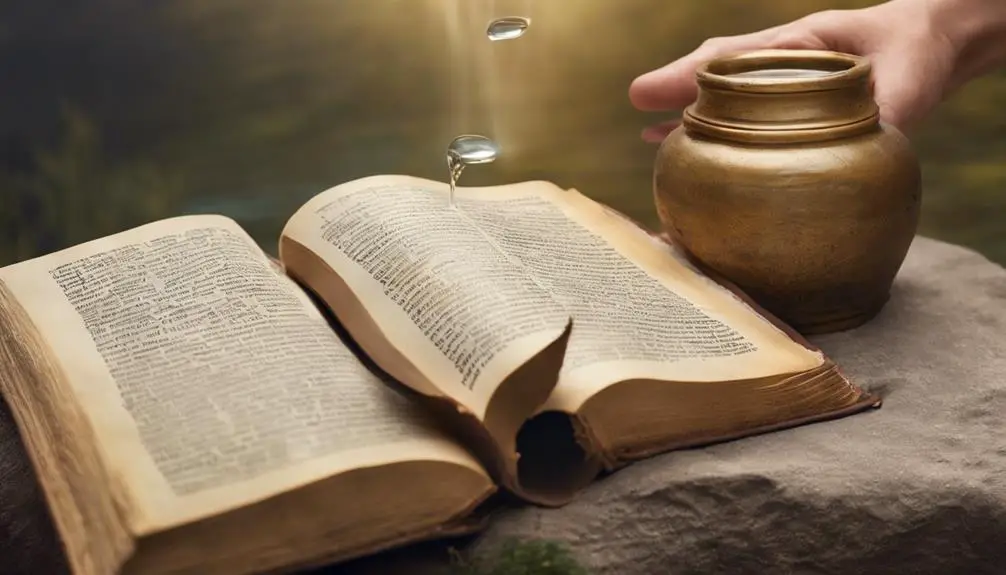
In the New Testament, the concept of unction evolves, reflecting a broader spiritual anointment beyond the physical act, pivotal for understanding early Christian beliefs and practices. You'll notice that this transformation aligns closely with the Pentecost event and apostolic teachings, marking a shift towards a more spiritual and communal understanding of anointing.
To give you a clearer picture, consider this table summarizing key New Testament instances and their significance:
Reference |
Significance |
|---|---|
Acts 2:1-4 |
The Pentecost event signifies the outpouring of the Holy Spirit, a form of divine unction on the early church. |
2 Corinthians 1:21-22 |
Shows how believers are anointed by God, sealing them with the Spirit as a mark of authenticity and protection. |
1 John 2:20, 27 |
Highlights an anointing from the Holy One, allowing believers to discern truth from falsehood. |
James 5:14 |
Advises the sick to call the elders for prayer and anointing with oil, a practice reflecting faith and reliance on God's healing. |
Hebrews 1:8-9 |
Refers to Jesus as anointed above his companions, emphasizing His divinity and leadership in the faith. |
These references illustrate how unction in the New Testament transcends the physical, embodying a spiritual empowerment and sanctification through faith in Jesus Christ. The apostolic teachings further elaborate on this, guiding the early church in understanding and living out the implications of this sacred anointment.
The Role of the Holy Spirit
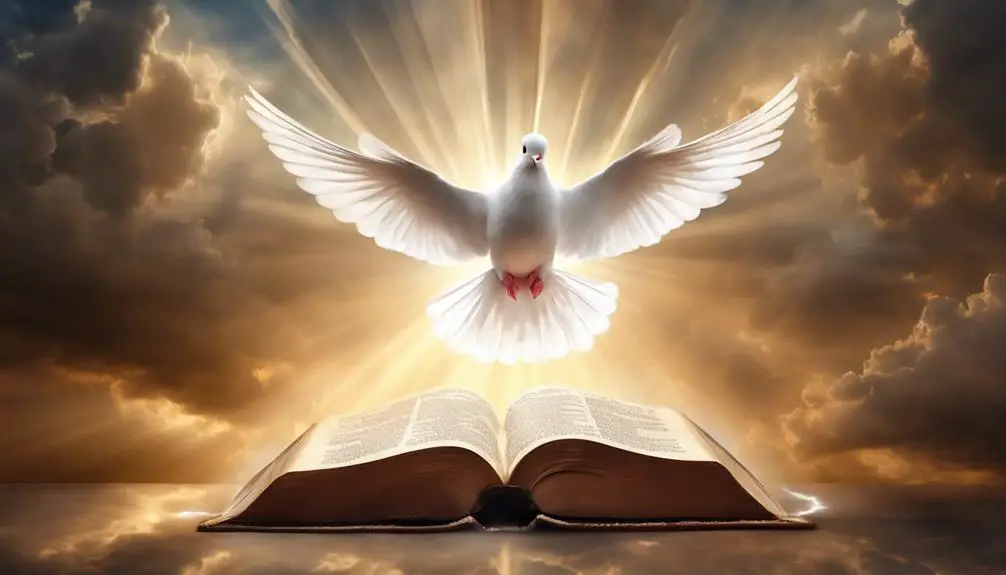
Central to understanding Christian theology, the Holy Spirit plays a pivotal role in empowering and guiding believers on their spiritual journey. This divine guidance manifests in various ways, deeply impacting one's faith and actions. The Holy Spirit's influence is multifaceted, providing both comfort and challenge as you navigate your spiritual path.
The significance of Pentecost can't be overstated when discussing the Holy Spirit's role. This event marks the descent of the Holy Spirit upon the apostles, empowering them to speak in tongues and spreading the message of Jesus Christ far and wide. It symbolizes the birth of the Church and the Holy Spirit's ongoing presence in the lives of believers.
Spiritual gifts are another crucial aspect of the Holy Spirit's role. These gifts aren't just talents or skills; they're divine empowerments given to believers for the edification of the body of Christ and the fulfillment of God's purposes on earth. The diversity and distribution of these gifts underscore the Holy Spirit's intentionality in uniting and strengthening the Church.
Consider the following imagery to grasp the Holy Spirit's role more deeply:
- A Compass: Guiding believers through the moral and spiritual complexities of life.
- A Wind: Representing the Holy Spirit's unseen, but powerful, influence.
- A Flame: Symbolizing the purification and passion the Holy Spirit instills within believers.
- A Dove: Symbolizing peace and the gentle presence of the Holy Spirit in one's life.
In this scholarly exploration, it's evident that the Holy Spirit's role is indispensable in empowering, guiding, and sanctifying the believer's life, making the spiritual journey rich and purposeful.
Modern Implications of Biblical Unction

Delving into the modern implications of biblical unction, it's crucial to recognize how this ancient practice shapes your spiritual life today. In contemporary terms, unction transcends mere religious ritual; it embodies spiritual empowerment and fosters a deeper connection with the divine. This sacred anointing, often associated with the Holy Spirit, empowers you to navigate life's complexities with grace and wisdom.
Spiritual empowerment, a core element of biblical unction, isn't just about personal growth; it's about transforming your interactions with the world around you. As you embrace this divine enablement, you'll find strength in vulnerability and wisdom in simplicity. It's a profound journey of self-discovery, where the seemingly ordinary moments of life are imbued with extraordinary significance.
Moreover, biblical unction has profound implications for leadership, particularly through the lens of Charismatic leadership. This form of leadership isn't merely about charismatic personalities; it's deeply rooted in the spiritual authority and authenticity that unction bestows. Charismatic leaders, anointed in this biblical sense, possess an innate ability to inspire and mobilize people towards a higher purpose. They lead not by domination but by example, guided by a moral compass that reflects their spiritual convictions.
In essence, the modern implications of biblical unction extend far beyond the confines of traditional religious practices. They permeate every aspect of your life, offering spiritual empowerment and redefining the essence of Charismatic leadership. By embracing this sacred anointing, you open yourself to a life of deeper meaning, purpose, and connection.
Frequently Asked Questions
How Has the Practice of Unction Influenced Contemporary Health and Wellness Trends, Particularly in the Context of Spiritual Healing or Alternative Medicine?
You'll find that the practice of unction has deeply influenced modern wellness trends, particularly through the rise of modern aromatherapy and the guidance of wellness influencers.
These elements echo ancient traditions of spiritual healing, integrating them into contemporary alternative medicine.
This blend of old and new practices enriches our understanding of wellness, offering a holistic approach that respects both physical and spiritual health in today's fast-paced world.
Are There Specific Prayers or Words That Must Be Recited During the Act of Unction, According to Various Denominations, That Are Not Directly Derived From Biblical Texts?
You're delving into a world where words carry weight, especially in sacred ceremonies. When it comes to unction, denominational differences shape the landscape, introducing prayer variations not strictly found in biblical texts.
Each tradition crafts its unique expressions of faith, blending ancient beliefs with contemporary spirituality. This intricate mosaic of prayers, though diverse, underscores a universal quest for divine connection and healing, transcending the boundaries of written scripture.
How Do Non-Christian Religions or Belief Systems View or Incorporate Practices Similar to Unction, and What Are the Historical Intersections Between These Practices?
You're exploring how diverse beliefs engage in practices akin to unction, seeking cultural parallels and ritual adaptations.
Many non-Christian religions have their own sacred anointing acts, deeply rooted in history, showing reverence for the divine or spiritual healing.
These traditions often intersect historically, illustrating a shared human inclination towards sanctified rituals.
While distinct in form and theology, these practices underscore a universal reverence for the sacred, transcending cultural boundaries.
In What Ways Have Artistic Representations of Unction (In Painting, Literature, or Film) Shaped Public Perceptions of This Religious Act Outside of a Strictly Biblical Context?
Artistic depictions, like a painter's broad strokes, have vividly colored public perceptions of unction. By taking artistic liberties, creators across painting, literature, and film have often introduced cultural misinterpretations to this sacred act.
You've witnessed how these representations, while enriching, can diverge from traditional understandings, weaving a tapestry where reverence meets critique. Such portrayals underscore the tension between preserving sanctity and exploring artistic expression, deepening the discourse around religious practices.
How Has the Legal and Social Status of Practitioners of Unction (Such as Priests or Healers) Evolved in Different Societies, Especially in Relation to the Authority to Perform Such Rites?
You've observed how the roles and recognition of those performing sacred rituals have shifted across cultures, particularly through changes in clerical attire evolution and legal frameworks adaptation.
The authority to carry out rites has been deeply influenced by societal norms and laws, leading to a complex interplay between tradition and modernity. This evolution reflects broader changes in how spiritual practices are valued and regulated, offering insight into the dynamic nature of cultural and legal perceptions.
Conclusion
As you've explored, unction holds a deep-rooted significance in biblical narratives, embodying both consecration and divine empowerment. Interestingly, in the Old Testament alone, anointing is mentioned over 70 times, illustrating its pervasive role in ancient rituals and leadership rites.
This statistic not only underscores unction's historical importance but also enriches our understanding of its sacredness. By appreciating this ancient practice, you're invited to reflect on the profound, spiritual dimensions it adds to faith and leadership in both historical and contemporary contexts.

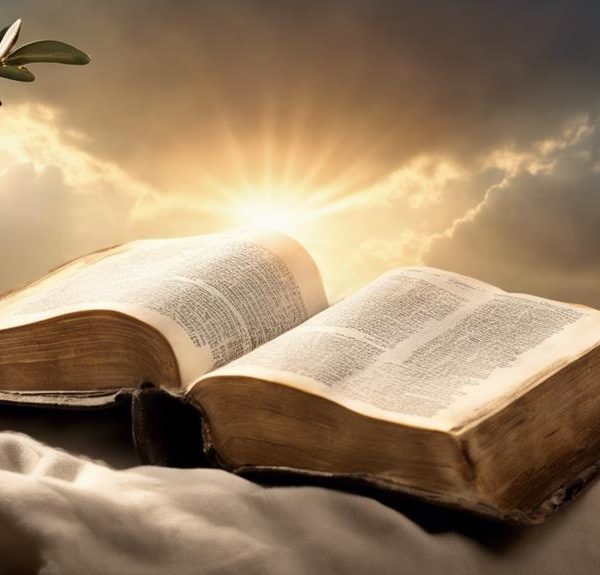

Sign up